Organisational Change Management: Why Human Resources Takes Centre Stage
In the words of the Greek philosopher Heraclitus, “The only thing that is constant is change.”1 Even though this catchphrase is over 2,500 years old, it is strikingly relevant to today’s operating environment.2 Organisations are increasingly realising the need to remain agile in the face of constant disruption.3
Change management offers organisations a way to respond to shifts in the workplace by putting a clear strategy in place. In essence, it’s the process that defines how an organisation transitions from a current to a future state of operations.4 Even if the focus is more granular – such as the need to explore new markets – the ultimate goal of change management is a pursuit of value.5
A new strategy requirement is identified by the top executives, who conceptualise a change management plan,6 usually with the involvement of human resources (HR) and other role players.7 While this is a technical process involving finance, legal, and compliance requirements, to name a few, the people management aspect will be key to the project’s success. HR is the one function that touches each individual in the company: the ideal position from which to facilitate change.8
Why change management is important
Technological advances, government policies and employee expectations are reshaping how we define work.9 With the pace of change increasing, businesses need to prepare themselves to operate within volatile, uncertain, complex and ambiguous (VUCA) environments.10 Compounding this uncertainty is the rise of disruptive technologies, such as artificial intelligence and virtual reality. As a result, digital transformation is making headlines on every company agenda.11 This is of particular relevance to South African companies, which face a sluggish economy12 together with a dire need to increase the pace at which they digitise.13
Disruption is real, and it’s impacting even the largest companies that used to be the most stable in the world. Today, there are almost no barriers to entry in any industry. Anyone can be a competitor, and this is really changing the game for long-established companies
Ken Toombs, global head of Infosys Consulting14
A 2018 Forbes Insights and a PMI survey reveals that 85 per cent of the 500 executive-level respondents say change management is essential to their success in these times of disruption.15
HR’s role in change management
The most serious threats to organisational transformation are human capital risks. According to the 2019 World Economic Forum Global Risks report, this includes the stress experienced by individuals who feel a lack of control in the face of uncertainty.16 Yet statistics released by Mercer indicate that only a third of executives say they are effective at mitigating these risks. HR managers mirror these sentiments: only a third strongly agree that executives prioritise human-capital risks.17
Disruption is happening at unprecedented levels. This, in turn, increases fear and insecurity as companies grapple with constant change. In order to allay these fears, managers need to communicate openly with staff and encourage them to keep updating their skills and be open-minded to transformation.18
To ensure the human agenda remains at the heart of change, HR needs a permanent place at the drafting table.
Mercer’s Global Talent Trends Report19
Gartner Insights indicate that HR departments will be responsible for managing the bulk of these changes.20 As Ben Peterson from BambooHR puts it: “HR is the company’s greatest advocate of values, because they are uniquely positioned within the company to have the greatest impact.”21
Encouragingly, over 50 per cent of high-growth companies say HR is involved in kick-starting a major company change, according to the 2019 Mercer Talent Trends report. It reveals the sentiments of over 7,000 respondents in 16 geographic locations and nine sectors.22
HR’s role in change management includes facilitating:
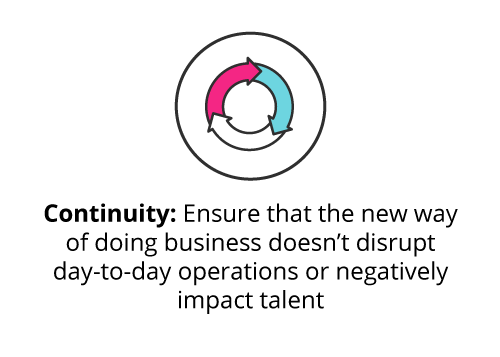
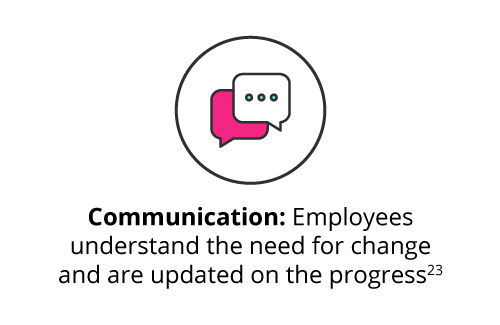
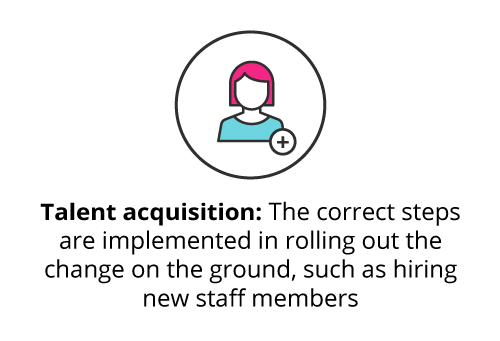
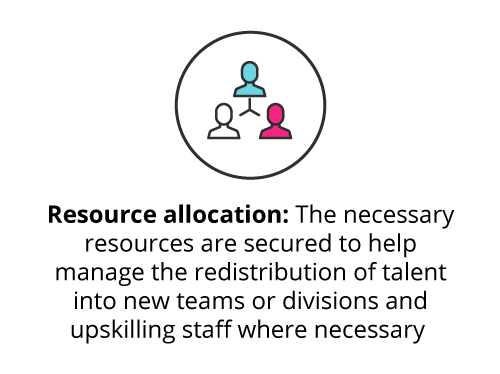
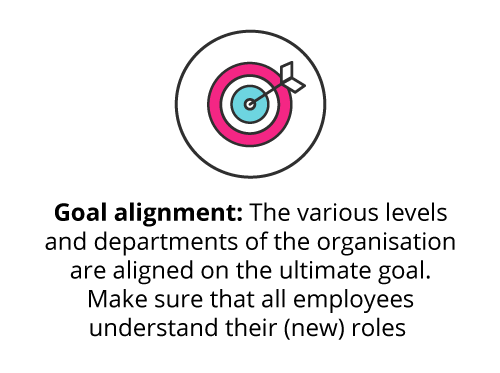
How to get teams to buy into change
Without the buy-in at all levels of the organisation, the transformation risks failure. As McKinsey explains: “A transformation’s success also requires that people across the organisation have a specific role to play and that everyone knows how to carry out his or her part.” Managers can even go so far as appointing change agents who make it their job to model new mindsets and behaviours to the rest of the employees.24
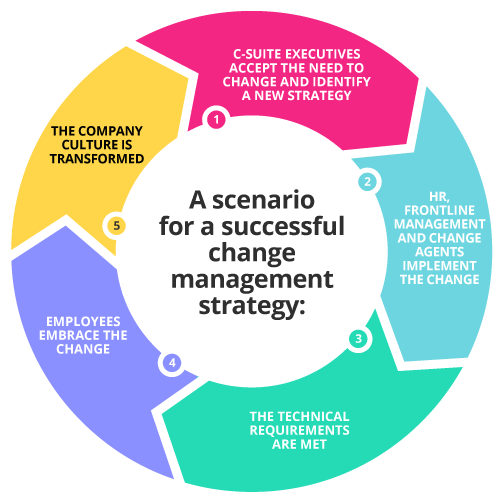
Katherine Latham, founder and managing partner of Chicago-based change agency Talman Consultants, adds that being open-minded to change, and realising that it is up to you as an individual, will give you a competitive edge. “My motto is you can’t change if you don’t own it.”25
The American Management Association cautions that, while talented staff are integral to the success of a restructuring agreement, they are often the first to leave the company if the future of the company is under question. Successful change management and diversification into new sectors therefore depends on enhancing existing expertise.26 “Organisations need to commit to building the necessary skill sets and making investments in training and certification. If you don’t do that now, you’re going to be in an ever-constant cycle of fighting for resources to support the transformation,” states Brett StClair, CEO of Siatik, a Google Cloud Premier Partner consultancy in Johannesburg.27
How to make your change management model effective
Most change efforts fail to deliver the anticipated benefits during the implementation phase. HR and frontline managers can increase the chance of success by putting checks and balances in place. “While you’re striving for growth, discipline – through governance, metrics, and other controls – allows you to stay on track. Without such controls in place, your company can easily lose its way,” suggest Harvard Business Review authors Bharat N Anand and Jean-Louis Barsoux.28 Finding the right direction for your journey, they say, should be “a compelling and uncontested priority”. HR can assist management by providing them with the necessary training to lead a successful change initiative.

When a company’s management craft a compelling vision and a clear strategy to break new ground, HR remains a key ingredient in this change. In essence, they help to communicate the transition to employees, manage their expectations, and foster a culture that breeds change agents.35
Learn more with the UCT Human Resource (HR) Management online short course.
- 1 (Nd). ‘Heraclitus: quotes’. Retrieved from Goodreads. Accessed 15 April 2019.
- 2 (Feb, 2007). ‘Heraclitus’. Retrieved from the Stanford Encyclopedia of Philosophy.
- 3 (Mar, 2019). ‘Three key principles of change management’. Retrieved from Forbes.
- 4 Michels, D. (Apr, 2019). ‘Change is changing: coping with the death of traditional change management’. Retrieved from Forbes.
- 5 Barsoux, J., & Anand, N. (Dec, 2017). ‘What everyone gets wrong about change management’. Retrieved from Harvard Business Review.
- 6 Tams, C. (Jan, 2018). ‘Why we need to rethink organisational change management’. Retrieved from Forbes.
- 7 (Mar, 2019). ‘Mercer 2019 Global Talent Trends Report’. Retrieved from Mercer.
- 8 (Mar, 2019). ‘Mercer 2019 Global Talent Trends Report’. Retrieved from Mercer.
- 9 (Mar, 2019). ‘Mercer 2019 Global Talent Trends Report’. Retrieved from Mercer.
- 10 Kraaijenbrink, J. (Dec, 2018). ‘What does VUCA really mean?’ Retrieved from Forbes.
- 11 (2018). ‘The C-Suite Outlook: How disruptive technologies are redefining the role of project management’. Retrieved from Forbes Insights.
- 12 (Mar, 2019). ‘South Africa’s economic growth seen stagnant’. Retrieved from Business Tech.
- 13 (2018). ‘South Africa falling behind with digital transformation’. Retrieved from PwC.
- 14 (2018). ‘The C-Suite Outlook: How disruptive technologies are redefining the role of project management’. Retrieved from Forbes Insights.
- 15 (Mar, 2019). ‘Three key principles of change management’. Retrieved from Forbes.
- 16 (Jan, 2019). ‘The Global Risks Report 2019’. Retrieved from World Economic Forum.
- 17 (Mar, 2019). ‘Mercer 2019 Global Talent Trends Report’. Retrieved from Mercer.
- 18(2018). ‘The C-Suite Outlook: How disruptive technologies are redefining the role of project management’. Retrieved from Forbes Insights.
- 19 (Mar, 2019). ‘Mercer 2019 Global Talent Trends Report’. Retrieved from Mercer.
- 20 (2018). ‘Help Optimize Organizational Change’. Retrieved from Gartner.
- 21 (Sep, 2018). ‘15 effective ways HR can help create a sustainable company culture’. Retrieved from Forbes.
- 22 (Mar, 2019). ‘Mercer 2019 Global Talent Trends Report’. Retrieved from Mercer.
- 23 Newell, C. (Jul, 2018). ‘Change as an opportunity: a strategic approach to change management’. Retrieved from Forbes.
- 24 (Feb, 2017). ‘The people power of transformations’. Retrieved from McKinsey.
- 25 Latham, K. (Apr, 2018). ‘Do you have the mindset of a change agent?.’ Retrieved from Forbes.
- 26 (Jan, 2019). ‘HR best practice during times of change’. Retrieved from American Management Association.
- 27 (2018). ‘The C-Suite Outlook: How disruptive technologies are redefining the role of project management’. Retrieved from Forbes Insights.
- 28 Barsoux, J., & Anand, N. (Dec, 2017). ‘What everyone gets wrong about change management’. Retrieved from Harvard Business Review.
- 29 Gleeson, B. (Feb, 2018). ‘Change as an opportunity: a strategic approach to change management’. Retrieved from Inc.
- 30 Gleeson, B. (Feb, 2018). ‘Change as an opportunity: a strategic approach to change management’. Retrieved from Inc.
- 31 (Nd). ‘Employee roles in initiating successful change management’. Retrieved from Prosci. Accessed 15 April 2019.
- 32 Gleeson, B. (Dec, 2018). ‘Five key ingredients for successful organizational change’. Retrieved from Forbes.
- 33 Young, S., & Kulesa, P. (Dec, 2017). ‘Employee experience in high-performance organizations’. Retrieved from Willis Towers Watson.
- 34 Gleeson, B. (Feb, 2018). ‘Change as an opportunity: a strategic approach to change management’. Retrieved from Inc.
- 35 (Sep, 2018). ‘15 effective ways HR can help create a sustainable company culture’. Retrieved from Forbes.